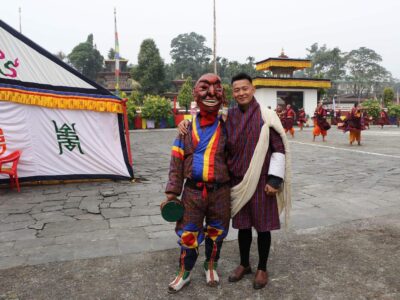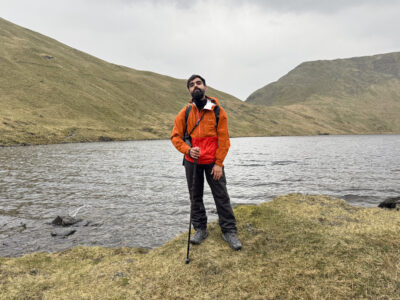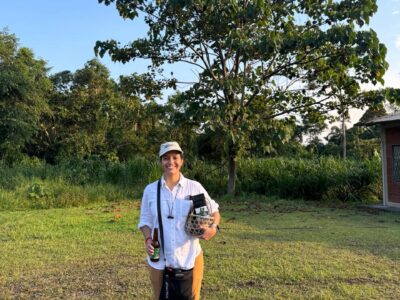Diana Sierra believes in opportunity. Sierra, a student in the Master of Science in Sustainability Management program, believes that having access to opportunities can make a big difference in someone’s life. Sierra is an industrial designer with more than seven years of experience and is a summer intern working with the Millennium Villages Project in Ruhiira, Uganda.
Seeing the experience as an opportunity to help empower people in a severely economically depressed part of the world, Sierra began working on two projects. Her first project was to analyze the value chain of a coffee cooperative and her second was to work with a women’s arts and crafts cooperative to market their products. Sierra felt that she would be particularly suited to help because she grew up on her father’s coffee farm in Santuario, Colombia.
Once Sierra began her work she realized there was a problem. She could analyze the value chain of the cooperative, but had trouble when it came to marketing the products of the village – they had very few products. The village only had the ability to produce simple woven products that were made mostly out of banana leaves. Most would be discouraged by these obstacles, but Sierra who creates “things out of necessity” felt this was a “playground for a designer.”
Sierra developed a plan to help women in this village succeed by teaching them a craft that could be turned into an economic opportunity. Sierra provided materials and instructors to 15 women in Ruhira to teach them how to weave glass bead accessories. Sierra, who views sustainability as a community having access to tools that improve their lives, realized that this was a relatively inexpensive means to teach the women of this village a craft which could be developed into a business.
“For many women in the village it is extremely difficult to send their kids to college, but at least they will be able to send them to school,” she says. The costs of sending their children to school are still high for mothers in the village. Sierra says that school fees “are the major motivation for mothers who see in this cooperative a major opportunity to provide for their kids.”
Empowering women is central to Sierra’s work. Women in the region of Uganda in which she is based have difficult lives – they are solely responsible for tending to agricultural production, planting, caring for the plantations, gathering water, cooking, and taking care of children. Women are the economic backbone of their communities.

Teaching women about glass bead weaving has been incredibly successful. At first, Sierra provided the materials and instructors with her own funds and now the women of the local community buy the materials from Sierra at wholesale cost and have sold their work for profit. Through funding from the Earth Institute, Sierra has also been able to set up a bead bank where the women can purchase materials at wholesale cost and still be able to generate a profit from their work.
According to Sierra, one of the key benefits is one that can’t be measured – it’s the strong ties of community and friendship that these women have developed while working together toward a common goal.
In addition to these efforts, since moving to Uganda on June 1, Sierra has been able to combine her focus on providing opportunities for women and on sustainability by developing products that can meet their basic needs and also generate business opportunities. One such project was to develop a sustainable sanitary pad. Young girls in the region drop out of school at alarmingly high numbers due to a lack of feminine care products during menstruation. Knowing this, Sierra knew that she could come up with an alternative to the expensive disposable pads and uncomfortable underwear stuffed with cloth and paper. Sierra says, “It was a fantastic opportunity for me to do something about it.” Her solution was a “hybrid” sanitary pad made from waterproof nylon that was reusable and washable. The design allows girls to stuff the pad with either toilet paper or, if they have access to clean water for washing, cloth.
Sierra’s Journey
Growing up in rural Colombia, Sierra understands the difficulty that one can have when denied the same opportunities as others. Children growing up in rural areas are often disadvantaged when compared to children in more affluent cities. Sierra had to work even harder to be able to earn a scholarship to Los Andes University.
On her first day at Los Andes University, Sierra was standing in the registration line for Architecture when she saw the Industrial Design booth. Her curiosity led her to ask what Industrial Design was and she was told, “A designer was like an architect but instead of building houses designers build objects! They are like inventors!” In her own words, “I was sold in that moment since what could be cooler than being an inventor.”
More than seven years later, Sierra has worked in industrial and product design with companies like Frog Design, Energizer, Playtex, Panasonic, and Nike. She chose to continue her education at Columbia University for her M.S. in Sustainability Management because she had always wanted to integrate environmental responsibility into her design process but, “lacked the technical background to properly present, communicate and monetize the benefits of doing so.”
Through the M.S. in Sustainability Management program Sierra has gained many valuable tools, but she credits Global Environmental Markets course with providing her with the knowledge of how small projects link with environmental markets. She says, “Now I am full of new ideas that incorporate design and the environment and even better I know there are ways to find the funds.”
Today Sierra is still working towards her degree while working with the Millennium Villages Project in Uganda. Sierra strongly believes in social enterprise and she chose this project because at its core it empowers people. It is not easy to understand the severity of needs of people in distant places of the world, but Sierra notes that it was when she arrived in Uganda that she truly understood the massive need of the people living there – and how she could help. Not discouraged or overwhelmed by the needs of those in her region of Uganda, Sierra realized, simply, that there was “so much opportunity in every sense.”
The M.S. in Sustainability Management program co-sponsored by the Earth Institute and the School of Continuing Education was designed to equip professionals interested in either advancing their careers in sustainability or those who would like to transition into a career in sustainability management. The Millennium Villages Project is an initiative led and executed by communities in Africa. Because Millennium Villages are an investment toward a sustainable end to extreme poverty, Millennium communities strengthen their local governments and institutions and certify the preparation and implementation of the interventions in their communities. The work of the Millennium Villages project is supported by a partnership with the Earth Institute, Millennium Promise, the United Nations Development Programme, and the United Nations Office of Project Services.Every year only a handful of graduate students are given the opportunity to intern with the Millennium Villages Project.



